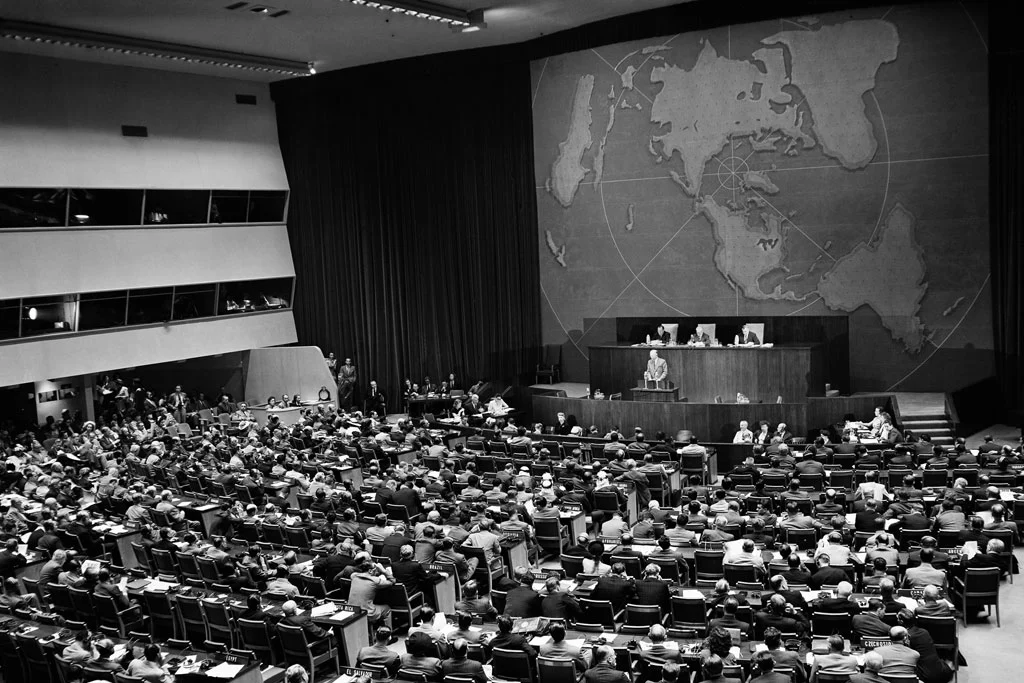The first world meeting to discuss questions about the Environment took place in Stockholm, Sweden, between June 5th and 16th, 1972, when representatives from 113 countries, including Brazil and the participation of several non-governmental organizations , met to address environmental issues, which was entitled “United Nations Conference on the Human Environment”.
On this occasion, issues such as water and soil pollution arising from industrial activity, atmospheric pollution and the pressure of global growth on natural resources were addressed, topics that were already starting to bother scientists and governments.
Aware of the need to establish common criteria and principles, the “Stockholm Declaration” was elaborated, when 07 Criteria were proclaimed and 26 Common Principles were established, which offered the peoples of the world inspiration and guidance for the preservation and improvement of the human environment. .
This conference constituted an important milestone in world ecopolitics, because it defended the importance of the environment, alerting the world about preservation and the responsibility of countries to preserve it. It was also on this occasion that the United Nations Environment Program – UNEP was created.
This Program is aimed at protecting the environment and promoting sustainable development and aims to coordinate international actions to protect the environment, aiming at guaranteeing an adequate life scenario, combined with the perpetuation of natural resources.
Do you want to know what are the 26 Principles of the Stockholm Declaration?
Read below the translation of the official document enacted in 1972.
Declaration of the UN Conference on the Human Environment
(free translation)
Stockholm, June 5-16, 1972
The United Nations Conference on the Human Environment, meeting in Stockholm from 5 to 16 June 1972, and, mindful of the need for common criteria and principles which will provide the peoples of the world with inspiration and guidance for preserving and improving the environment human environment,
I
Proclaims that:
- Man is at the same time the work and builder of the environment that surrounds him, which gives him material sustenance and offers him the opportunity to develop intellectually, morally, socially and spiritually. In the long and tortuous evolution of the human race on this planet, a stage was reached in which, thanks to the rapid acceleration of science and technology, man acquired the power to transform, in countless ways and on an unprecedented scale, everything that fence. Both aspects of the human environment, the natural and the man-made, are essential for human well-being and for the enjoyment of fundamental human rights, including the right to life itself.
- The protection and improvement of the human environment is a fundamental issue that affects the well-being of peoples and economic development around the world, an urgent desire of peoples around the world and a duty of all governments.
- Man must constantly evaluate his experience and keep discovering, inventing, creating and progressing. Nowadays, man's ability to transform his surroundings, used with discernment, can bring the benefits of development to all peoples and offer them the opportunity to ennoble their existence. Wrongly and recklessly applied, the same power can cause incalculable harm to humans and their environment. Around us, we see evidence multiplying of damage caused by man in many regions of the earth, dangerous levels of pollution of water, air, land and living beings; major upsets of the ecological balance of the biosphere; destruction and depletion of irreplaceable resources and serious deficiencies, harmful to the physical, mental and social health of man, in the environment created by him, especially in the one in which he lives and works.
- 4. In developing countries, most environmental problems are caused by underdevelopment. Millions of people continue to live far below the minimum levels necessary for a dignified human existence, deprived of food and clothing, housing and education, adequate health and hygiene conditions. Thus, developing countries must direct their efforts towards development, bearing in mind their priorities and the need to safeguard and improve the environment. To the same end, industrialized countries must strive to reduce the gap that separates them from developing countries. In industrialized countries, environmental problems are generally related to industrialization and technological development.
- 5. The natural growth of the population continually poses problems related to the preservation of the environment, and appropriate norms and measures must be adopted to face these problems. Of all things in the world, human beings are the most valuable. They are the ones who promote social progress, create social wealth, advance science and technology and, through their hard work, continually transform the human environment. With social progress and advances in production, science and technology, man's ability to improve the environment increases with each passing day.
- We have reached a moment in history when we must guide our actions around the world with particular attention to the consequences they may have on the environment. Through ignorance or indifference, we can do immense and irreparable harm to the earth's environment on which our lives and well-being depend. On the contrary, with deeper knowledge and more prudent action, we can achieve better living conditions for ourselves and our posterity, in an environment more in line with man's needs and aspirations. The prospects for raising the quality of the environment and creating a satisfying life are great. Enthusiasm is needed, but on the other hand, serenity of spirit, hard and systematic work. To reach the fullness of his freedom within nature, and in harmony with it, man must apply his knowledge to create a better environment. The defense and improvement of the human environment for present and future generations has become the imperative goal of humanity, which must be pursued, while maintaining the fundamental goals already established, peace and economic and social development in around the world, and in accordance with them.
- To reach this goal, it will be necessary for citizens and communities, companies and institutions, at all levels, to accept the responsibilities they have and for all of them to participate equitably in this common effort. Men of all walks of life and organizations of different types will shape the environment of the future, integrating their own values and the sum of their activities. Local and national administrations, and their respective jurisdictions, are responsible for most of the standard setting and application of large-scale measures on the environment. International cooperation is also required in order to obtain resources that help developing countries to fulfill their part in this sphere. There is an ever-increasing number of problems relating to the environment which, because they are regional or global in scope or because they have repercussions in the common international sphere, require broad collaboration between nations and the adoption of measures by international organizations, in the interest of all. . The Conference urges governments and peoples to join efforts to preserve and improve the human environment for the benefit of man and his posterity.
II
PRINCIPLES
It expresses the common conviction that:
Principle 1
Man has the fundamental right to freedom, equality and the enjoyment of adequate living conditions in an environment of such quality that allows him to lead a dignified life and enjoy well-being, having the solemn obligation to protect and improve the environment. environment for present and future generations.
In this regard, policies that promote or perpetuate apartheid, racial segregation, discrimination, colonial oppression and other forms of oppression and foreign domination are condemned and must be eliminated.
Principle 2
The earth's natural resources including air, water, land, flora and fauna and especially representative samples of natural ecosystems must be preserved for the benefit of present and future generations through careful planning or management.
Principle 3
The earth's capacity to produce vital renewable resources must be maintained and wherever possible restored or improved.
Principles 4
Man has a special responsibility to preserve and judiciously manage the heritage of wild flora and fauna and their habitat, which are currently in serious danger due to a combination of adverse factors. Consequently, when planning economic development, importance must be attached to the conservation of nature, including wild flora and fauna.
Principle 5
The earth's non-renewable resources must be used in a way that avoids the danger of their future depletion and ensures that all humanity shares in the benefits of their use.
Principle 6
Finally, the discharge of toxic substances or other materials that release heat, in such quantities or concentrations that the environment cannot neutralize them, so as not to cause serious and irreparable damage to ecosystems. The just struggle of the peoples of all countries against pollution must be supported.
Principle 7
States shall take all possible measures to prevent pollution of the seas by substances that may endanger human health, living resources and marine life, impair the possibilities of spillage or impede other legitimate uses of the sea.
Principle 8
Economic and social development is essential to ensure a favorable living and working environment for man and to create the necessary conditions on earth to improve the quality of life.
Principle 9
Deficiencies of the environment originating from conditions of underdevelopment and natural disasters pose serious problems. The best way to remedy them is in accelerated development, through the transfer of considerable amounts of financial and technological assistance that complement the internal efforts of developing countries and the timely assistance they may require.
Principle 10
For developing countries, price stability and obtaining adequate income for basic products and raw materials are essential elements for ordering the environment, since economic factors and ecological processes must be taken into account.
Principle 11
The environmental policies of all States should be aimed at increasing the current or future growth potential of developing countries and should not restrict this potential or place obstacles in the way of achieving better living conditions for all. States and international organizations should take relevant measures, with a view to reaching an agreement, in order to be able to face the economic consequences that could result from the application of environmental measures, at the national and international levels.
Principle 12
Resources should be allocated to the preservation and improvement of the environment, taking into account the circumstances and special needs of developing countries and expenditures that could lead to the inclusion of environmental conservation measures in their development plans, as well as the need to offer them, when requested, further international technical and financial assistance for this purpose.
Principle 13
With a view to achieving a more rational use of resources and thus improving environmental conditions, States should adopt an integrated and coordinated approach to planning their development, so as to ensure compatibility between development and the need to protect and improve the human environment for the benefit of its people.
Principle 14
Rational planning constitutes an indispensable tool for reconciling the differences that may arise between the demands of development and the need to protect and improve the environment.
Principle 15
Planning must be applied to human settlements and urbanization with a view to avoiding harmful repercussions on the environment and obtaining the maximum social, economic and environmental benefits for all. In this regard, projects aimed at colonialist and racist domination must be abandoned.
Principle 16
In regions where there is a risk that the rate of population growth or excessive concentrations of population will harm the environment or development, or where low population density may impede the improvement of the human environment and limit development, Demographic policies were implemented that respected fundamental human rights and had the approval of the governments concerned.
Principle 17
Competent national institutions must be entrusted with the task of planning, administering or controlling the use of the states' environmental resources, with a view to improving the quality of the environment.
Principle 18
As part of its contribution to economic and social development, science and technology must be used to discover, avoid and combat the risks that threaten the environment, to solve environmental problems and for the common good of humanity.
Principle 19
An effort towards education on environmental issues, aimed at both the young generations and adults and which pays due attention to the less privileged sector of the population, is essential to found the foundations of a well-informed public opinion, and of an individual's conduct , companies and communities inspired by their sense of responsibility for protecting and improving the environment in all its human dimensions. It is equally essential that the mass media avoid contributing to the deterioration of the human environment and, on the contrary, disseminate information of an educational nature about the need to protect and improve it, so that man can develop. if in all respects.
Principle 20
Scientific research and development concerning environmental problems, both national and multinational, must be encouraged in all countries, especially in developing countries. In this case, the free exchange of up-to-date scientific information and experience on the transfer should be supported and assisted in order to facilitate the solution of environmental problems. Environmental technologies must be made available to developing countries in such a way as to favor their wide diffusion, without constituting an economic burden for these countries.
Principle 21
In accordance with the Charter of the United Nations and the principles of international law, States have the sovereign right to exploit their own resources in application of their own environmental policy and the obligation to ensure that the activities carried out , within its jurisdiction, or under its control, do not harm the environment of other States or areas located outside any national jurisdiction.
Principle 22
States must cooperate to further develop international law regarding liability and compensation for victims of pollution and other environmental damage that activities carried out within the jurisdiction or under the control of such States cause to areas outside their jurisdiction.
Principle 23
Without prejudice to the consensus criteria of the international community and the norms that must be defined at national level, in all cases it will be essential to consider the systems of values prevailing in each country, and the applicability of norms that, although valid for the most advanced technologies, may be inappropriate and of high social cost for developing countries.
Principle 24
All countries, large and small, should concern themselves with spirit and cooperation and on an equal footing with international questions relating to the protection and improvement of the environment. It is essential to cooperate to effectively control, avoid, reduce and eliminate the harmful effects that activities carried out in any sphere may have on the environment, through multilateral or bilateral agreements, or by other appropriate means, respecting the sovereignty and interests of from all states.
Principle 25
States must ensure that international organizations carry out coordinated, effective and dynamic work in the conservation and improvement of the environment.
Principle 26
It is necessary to free man and his environment from the effects of nuclear weapons and all other means of mass destruction. States should strive to reach early agreement – in the relevant international bodies – on the elimination and complete destruction of such weapons.




